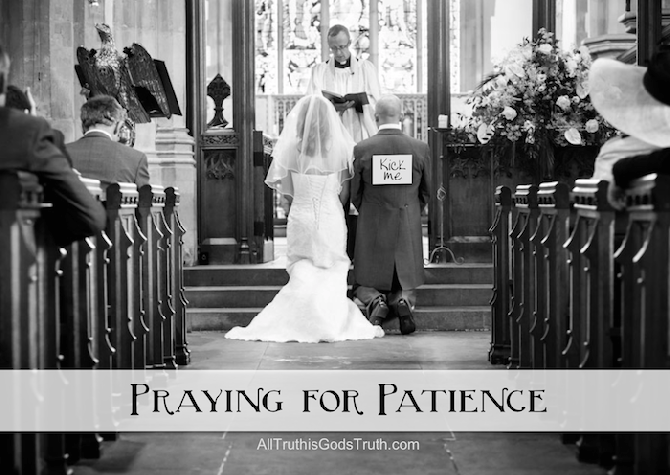
Praying for patience is a little like asking some one to tape a "Kick Me" sign on your back. There's no easy way to learn it, except to endure countless events that drive you crazy.
Opportunities to practice patience fall into two broad categories, and I'd be hard-pressed to say which is most important.
The first category is acute circumstances that call for patience: You're stuck in traffic. You're waiting for a reply to an important text or phone call. Somebody is doing something that drives you absolutely nuts.
What's your instinctive response? If it involves angry words, exasperated sighs, long-winded lectures, or skyrocketing blood pressures, then it's time to change your habits. Take a deep breath and focus on being kind, remaining calm, and not overreacting.
Of course, exercising patience does not mean you don't deal with the problems that arise; it only dictates that you deal with them in a logical, loving way, rather than in a cycle of rage and regret.
Scripture implores us to "admonish the unruly, encourage the fainthearted, help the weak, be patient with everyone." (1 Thessalonians 5:13-14, NASB)
The second (and more difficult) category of patience-trying opportunities involves chronic or long-term problems.
These would include major life changes: You go bankrupt. You lose a loved one. You're diagnosed with an incurable, debilitating illness.
But it can also include comparatively minor stuff: Nobody is actively getting on your nerves in a dramatic sort of way, but nonetheless, you must still draw deeply and repeatedly from your reserves of patience as they slowly mature over time.
Your spouse, your children, your friends - and, indeed, you yourself - are all works in progress. We emerge from the womb knowing nothing, and go to our graves knowing little more. In every area of life, we are in a continual process of acquiring knowledge and experience, of progressing from nothing to little of nothing.
By definition, every person we know is either behind us, ahead of us, or right there beside us on this continuum of growth. If ahead, we call them a teacher. Behind us, we call them a student. With us, we call them a companion.
You will find that your wife is a combination of all three of these roles. She will be ahead of you in some areas and behind in others: Sometimes, your teacher. Sometimes, your student. Always, your companion.
God designed each of you to complement the other. Accordingly, you both have different strengths and different weaknesses.
When we fall short in the area of acute patience - snapping at people because they didn't do things precisely the way we like them - the underlying issue is usually one of pride.
It is a forgetfulness of where we once were on the learning continuum or an exaggeration of where we are now on that same continuum.
Patience recognizes that proficiency grows over time - we have not always been as skilled as we are now. Patience is also mindful of the
 Order Book
Order Book fact that, even at our present skill-level, we can still make mistakes.
When we fail in the area of long-term patience, it is often due to a lack of vision. We fail to see what the other person could become; we see them only as they are now.
Goethe once said, "If you treat an individual as he is, he will remain how he is. But if you treat him as if he were what he ought to be and could be, he will become what he ought to be and could be."
This goes for your wife, too. God has charged you to live with her in an understanding way, to treat her with patience and gentleness, as a weaker vessel. So bear with her. Don't expect perfection from her. Be patient with her. Love her.
This is what the Word of God requires of us, not only in the way we relate to our wives, but to our children and to the other people He places in our path, as well:
"So, as those who have been chosen of God, holy and beloved, put on a heart of compassion, kindness, humility, gentleness and patience; bearing with one another, and forgiving each other, whoever has a complaint against anyone; just as the Lord forgave you, so also should you. Beyond all these things put on love, which is the perfect bond of unity. Let the peace of Christ rule in your hearts, to which indeed you were called in one body; and be thankful." (Colossians 3:12-15, emphasis added)
The peace of Christ, ruling in your heart. Is that what your wife and children witness when you are irritated? Is it what your friends and family see when you face frustration? When somebody's pushing your buttons, do you respond with humility, kindness, and gentleness?
As a Christian, that is what we are called to do. It's a tall order, and I'll be the first to admit that I often fail the test.
I've never cheated on my wife or beaten her or abandoned her, and in light of that stellar track record, it's tempting to excuse the fact that I sometimes lose patience or say things I shouldn't say using tones I shouldn't use.
But God has been convicting me lately that, in His eyes, there are no "small" sins. My impatience is grievous to Him, and they should be grievous to me - just as yours should be to you.
God isn't interested in excuses or explanations or justifications for why we let our patience lapse. Nor is He impressed by half-hearted apologies or requests for forgiveness that aren't accompanied by genuine repentance.
It isn't enough to admit impatience is sin if we then persist in our bad habits.
God is calling us to turn away from our sin. To give up our irritated, impatient, prideful ways and allow Him to remake us in the image of Christ.
Are you willing to let Him do that?



